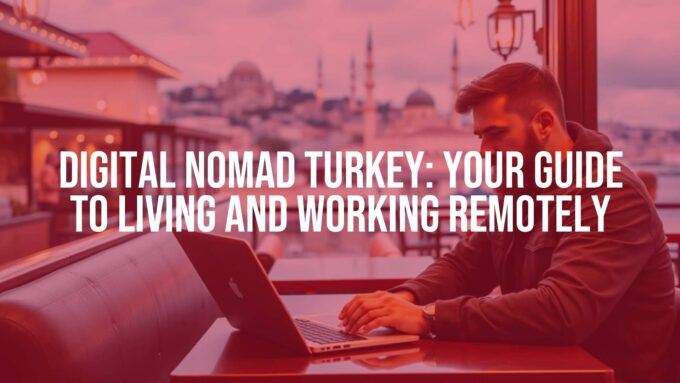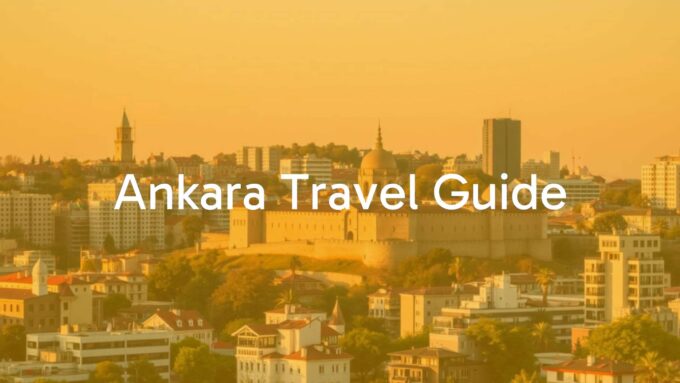If you’re looking for a place full of ancient history, lively culture, and stunning scenery, Turkey is a great choice. This country connects Europe and Asia, giving travelers a mix of incredible experiences: busy markets in Istanbul, the strange rock formations of Cappadocia, and sunny beaches along the Turquoise Coast. Whether you love history, outdoor activities, food, or just want to relax, Turkey offers remarkable memories and friendly locals.
Turkey’s deep traditions, wide-ranging landscapes, and welcoming people make it more than just a typical holiday destination. Get ready to explore ancient landmarks, try amazing local food, and create lasting memories.

Why Visit Turkey?
Turkey stands out because of its contrasts and variety. It has something for every kind of traveler, offering old-world wonders and modern fun.
From your first steps in Turkey, you’ll notice the energy and the helpfulness of the locals. Here, you can walk where Romans and Ottomans once did, see some of the world’s greatest sites, and drink tea with friendly shopkeepers. You’ll find rich history alongside lively, modern adventures everywhere you go.
Top Destinations in Turkey
Turkey is packed with famous places worth seeing. Istanbul, the busy city linking Europe and Asia, is often the starting point. Its skyline is filled with mosques and palaces that tell ancient stories. You can explore the huge Grand Bazaar, visit the beautiful Hagia Sophia, and see the impressive Blue Mosque.
Outside of Istanbul, Cappadocia waits with its unusual landscapes-watch hot air balloons rise over its chimney-like rocks. Visit the ancient city of Ephesus for a step back in Roman history, walking roads that philosophers and gladiators once used. Pamukkale is also famous for white, mineral-rich pools flowing down cliffs, looking like a “cotton castle.”

Special Cultural and Historical Activities
Turkey’s history is broad and diverse. Many civilizations have left their marks here. You can discover the remains of Troy, the old battlegrounds at Gallipoli, and Cappadocia’s underground cities, dug out for shelter long ago.
There’s much to do beyond sightseeing: try a traditional Turkish bath for relaxation, watch the Whirling Dervish dancers in Konya, or enjoy long chats over tea in a local garden. Playing backgammon with residents is also a good way to break the ice. Turkish people are known for their kindness, making every small encounter enjoyable.
Nature and Scenery
Turkey’s natural surroundings change a lot from place to place. With almost 8,000 km of coastline, there are sunny beaches on the Mediterranean and steep cliffs on the Black Sea. The Turquoise Coast has some of the best seaside towns like Bodrum and Fethiye-great for boating or paragliding over blue waters.

Go inland and you’ll find sights like Cappadocia’s moonscape valleys and the thermal pools of Pamukkale. Even areas less visited, such as the eastern mountains, offer hiking, waterfalls, and beautiful views. There’s something here for everyone, no matter if you want calm beaches or rugged mountains.
Best Time to Visit Turkey
Picking the right season for your trip to Turkey makes a big difference because the weather and events vary by area and time of year. Each season has its own advantages depending on what you want to do-whether you like warm weather, want to see historic sights, or enjoy winter landscapes.
Weather by Season
Turkey has different climates across the country. The southern coast is warm, while the center and east are colder. Summer (May-September) is hot and dry-perfect for beaches, but inland cities can be extremely warm. July and August are the hottest.
Spring (April-May) and autumn (October) are comfortable with mild weather and fewer tourists, ideal for sightseeing. Spring brings out wildflowers; fall shows colorful leaves. Winter (November-March) gets cold, especially inland, with snow in places like Cappadocia, but coastal spots are milder.
Festivals and National Holidays
A variety of holidays happen in Turkey, giving your visit some local flavor but sometimes causing crowds or closed businesses. Religious holidays such as Eid al-Fitr and Eid al-Adha change yearly as they follow the lunar calendar. During these times, transport and hotels can be busier and more expensive.
Big national days include Republic Day (October 29) and Youth and Sports Day (May 19), bringing parades and festivities. Cities also have local events, like Istanbul’s tulip festival in April and summer jazz or film festivals. Checking what’s on before your visit helps you plan around busy times or join the fun.
Tourist Seasons: High, Shoulder, and Low
| Season | Months | What to Expect |
|---|---|---|
| High | June-early September | Hot, busy everywhere, highest prices. |
| Shoulder | April-May, late September-October | Milder weather, fewer crowds, better deals. |
| Low | November-March | Cool/chilly, especially inland; quieter; lowest prices. |
If you want warm weather but fewer crowds and lower costs, spring and fall are your best bet.

Planning Your Turkey Trip
A bit of planning helps your Turkey trip go smoothly. Know the entry rules, manage your budget, and check health advice before you go. Turkey is easy to travel around, and its tourist services work well.
Visas and Entry Rules
Check what visa you need based on your citizenship before booking anything. Many people can apply online for an e-Visa. Always use the official Turkish government website to avoid scams.
- Your passport should be valid at least six months after leaving Turkey.
- You need at least two blank pages for entry stamps.
Travel Insurance and Health
Travel insurance is important for every trip, including Turkey. It should cover health emergencies, cancellations, lost bags, and more. Major cities have solid medical care, but it’s still wise to be prepared.
- Check with your doctor for any needed vaccines.
- Bring essential prescriptions and a copy of the script.
- Drink plenty of water and eat safely.
Money and Exchange Rates
The currency is Turkish Lira (TL). Credit cards work in big cities, but always have some cash-especially in rural areas or markets. ATMs are everywhere.
| Budget Level | Daily Cost (₺/USD) |
|---|---|
| Budget | ₺1,000-₺1,500 ($30-$50) |
| Mid-range | ₺2,000-₺3,500 ($60-$100) |
| Luxury | ₺4,000+ ($120+) |
- Watch exchange rates-they change often.
- Tipping is common, so allow for this.
How Much Does It Cost to Travel in Turkey?
Turkey is known for great value and doesn’t have to be expensive unless you want luxury hotels and private tours. With smart choices, you can travel well on a budget.
Example Daily Costs
- Budget: Dorm bed/hostel, street food, public buses = ₺1,000-₺1,500/day
- Mid-range: Small hotel, nice restaurants, more activities = ₺2,000-₺3,500/day
- Luxurious travel: 4-5 star hotels, private tours, flights = ₺4,000+/day
Ways to Save Money
- Use buses for travel between cities-they’re comfortable and cheap.
- Book domestic flights early for the best rates.
- Eat street food or at small, local places for both taste and savings.
- Buy a Museum Pass if you’ll visit many sites-it adds up to savings.
- Bargain in markets-haggling is normal.
- Stay a bit away from city centers for lower hotel prices.
Main Regions and Cities to Visit
Turkey is huge, and each region is different. Try to visit more than one area to get a better sense of the country.
- Istanbul: Historic center (Sultanahmet) with Hagia Sophia, Blue Mosque, Topkapı Palace, Grand Bazaar; modern neighborhoods like Beyoğlu and Karaköy for nightlife and cafes; Bosphorus cruises for beautiful views.
- Cappadocia: Unique landscapes, cave hotels, rock-cut churches, hot air balloon rides, and underground cities like Derinkuyu.
- Pamukkale & Ephesus: White mineral terraces and ancient Roman ruins, plus the Library of Celsus and the Great Theatre at Ephesus.
- Antalya & The Turquoise Coast: Mediterranean beaches, old town Kaleiçi, water sports, ruins, and hiking paths.
- Bodrum & Marmaris: Aegean resorts with lots of nightlife, beaches, and a good starting point for boat cruises.
- Ankara & Central Anatolia: The capital city, Atatürk’s Mausoleum, the Museum of Anatolian Civilizations, and old city charm.
- Eastern Turkey: Less crowded, more rugged, with highlights like Lake Van, Mount Ararat, the ruins at Ani, and Ishak Pasha Palace.
Things to Do in Turkey
Whether you like history, action, or eating great food, Turkey has it all.
- Historical sites & Museums: Hagia Sophia, Blue Mosque, Topkapı Palace in Istanbul; Ephesus ruins; Göreme Open-Air Museum in Cappadocia; ancient Hierapolis near Pamukkale.
- Outdoor adventures: Hot air ballooning, sailing boat trips, hiking/cycling paths, quad biking, and paragliding.
- Boat trips: Gulet cruises along the Aegean and Mediterranean coast for a few days or a week are a special way to see hidden beaches and historic ruins.
Food and Drink in Turkey
Turkish food is full of rich flavors and history. Eating is a big part of daily life here and often enjoyed with others.
Famous Dishes and Local Specialties
- Kebabs (like Adana, Urfa, and döner)
- Turkish breakfast: cheeses, olives, bread, jams, eggs, sausage
- Mezes (small starters) like hummus, dolma, and yogurt dips
- Hearty stews (güveç) and lentil soups
- Fresh seafood, especially on the coasts
- Regional treats: anchovies in the Black Sea, spicy lahmacun and künefe in the Southeast

Street Food, Markets, and Tours
Try simit (bread rings), fish sandwiches, roasted chestnuts, and stuffed mussels from street stalls. Explore bazaars for Turkish delight and dried fruits. Join a local food tour to get insider tips and taste a range of local dishes.
Turkish Drinks
- Turkish tea (çay): Drunk everywhere, all day.
- Turkish coffee: Strong, served in small cups (don’t drink the grounds at the bottom).
- Ayran: Cool yogurt drink, popular in summer.
- Salep: Warm drink made from orchids, nice in winter.
- Rakı: Strong, anise-flavored drink, often with dinner.
Where to Stay in Turkey
There’s a wide choice of places to sleep, from unique cave hotels to huge resorts and small boutique hotels.
- Cave hotels: In Cappadocia, these let you sleep in ancient rock chambers with modern comforts.
- Resorts: Found along the coast (Antalya, Bodrum, Marmaris), ranging from simple to very luxurious.
- Boutique hotels: Often in old city centers or old houses, with personal service and local style.

Which Area Fits Your Budget?
- Sultanahmet (Istanbul): Close to historic sites, usually pricier.
- Beyoğlu or Galata: Cheaper, lively, still central.
- Kadıköy: Lower prices, good food, bohemian vibe.
- Göreme (Cappadocia): Cave hotels for all budgets.
- In beach towns: Central towns often have lower-cost options, while big resorts are a bit outside the main area.
- Staying outside the busiest tourist streets often gets you more value.
Other Accommodation Choices
- Short-term apartments (Airbnb, etc.): Great for groups or longer stays.
- Hostels: Great for meeting people, saving cash, or short overnights.
- Pansiyons: Simple, family-run guesthouses, cheap and friendly, often found in smaller towns.
Getting Around Turkey
Traveling within Turkey is easy, with many transport options:
Domestic Flights
Flying is the fastest way between distant places, and Turkey has many airports. Main hubs include Istanbul (IST, SAW) and Ankara (ESB). Main airlines are Turkish Airlines and Pegasus. Book ahead for best prices.
Buses, Trains, and Ferries
- Buses: Cover almost every city and town, comfortable and reliable, onboard snacks and WiFi often included.
- Trains: High-speed lines like Istanbul-Ankara-Konya, pleasant but not as widespread as buses.
- Ferries: Great for short trips around Istanbul or along the coast, giving lovely sea views.
Car Rental
Renting a car is good for exploring regions like Cappadocia or Aegean coasts. You’ll need an international license. Roads are generally good but driving in cities is busy. Parking can be hard in big cities. For long or multi-city trips, public transport may be simpler.
Airport Transfers and Taxis
Airports offer shuttles, buses, or private cars to central areas. Taxis are common, but always use official ones and make sure the meter is on. Dolmuş minibuses run fixed routes, are very cheap, and give you a glimpse into local life.
Tips for First-Time Visitors
If you’re new to Turkey, a bit of basic planning will help you get more out of your trip.
Safety and Scams
- Turkey is generally safe for visitors.
- Pickpocketing can happen in crowded areas-stay alert.
- If using taxis, insist on the meter or agree on a fare before you start.
- Decline offers for “help” from strangers at landmarks-sometimes they expect money.
- Bargaining in markets is normal-start low and smile.
Local Customs and Etiquette
- Dress modestly in religious places (cover arms/legs; women cover hair).
- Always take off shoes before entering a mosque.
- Learn greetings like “Merhaba” (hello) and “Teşekkür ederim” (thank you).
- Tea is often offered-accepting builds friendships.
- Public displays of affection aren’t common, especially in conservative areas.
Basic Turkish Words
| Merhaba | Hello |
| Teşekkür ederim | Thank you |
| Lütfen | Please |
| Evet | Yes |
| Hayır | No |
| Ne kadar? | How much? |
| Afiyet olsun | Enjoy your meal |
| Güle güle | Goodbye (from the person staying) |
Most signs use the Latin alphabet, making it easier to get around. Language apps can help if you get stuck.
Staying Connected: SIM Cards and WiFi
Free Wi-Fi is found in many hotels and cafes. For more reliable access, buy a local SIM card from Turkcell, Vodafone, or Türk Telekom-you’ll need your passport. If your phone allows, an eSIM is even easier and can be arranged online. Having mobile data helps with maps and directions during your trip.
Special Types of Trips in Turkey
Turkey is a good fit for special interests-families, weddings, or even medical visits.
Traveling With Children
- Family-friendly resorts have pools and clubs for kids.
- Historical ruins and open-air museums are fun to explore.
- Turkish food usually includes something for everyone, even picky eaters.
Weddings and Honeymoons
- Many hotels and resorts offer packages for weddings and honeymoons.
- Popular spots: Istanbul, Cappadocia, and the coast.
- Cave hotels and gulet boat trips are especially romantic.
Accessibility and Medical Tourism
- Wheelchair access is improving, especially in new buildings and public transport, but old city areas can be tricky.
- Turkey offers lower-cost medical treatments (dentistry, surgeries, etc.) in modern clinics with good reputations.
- Packages often include accommodation and support with logistics.
Frequently Asked Questions
How much time do I need in Turkey?
- 7-10 days: Enough for Istanbul and one more place (like Cappadocia or the West Coast).
- 2 weeks: Lets you see a mix of cities, ancient sites, and the beach.
- 3 weeks: Time to explore more areas, including Eastern Turkey and smaller towns without rushing.
Is it safe to visit Turkey right now?
Yes, most tourist areas are safe, and Turkey is open for visitors. Stay up to date with news and follow any travel advice from your home country. Major sites like Istanbul, Cappadocia, and the west coast are away from any trouble spots near the Syrian border.
What should I pack?
- Summer: Light clothes, sun protection, swimwear, comfortable shoes, light jacket for evenings.
- Spring/Fall: Layers, including long sleeves and light sweaters.
- Winter: Warm coat, gloves, hat, boots if visiting inland or eastern regions (snow is common).
- Modest clothing for mosque visits.
- Travel adapter for electronics.
Is Turkey a good place for solo travelers?
Yes, many people visit alone and feel at ease. Public transport is reliable, and locals are helpful and open to visitors. Hostels and guided activities make it easy to meet others. As always, be careful in crowded areas and keep an eye on your things, just as you would anywhere else.















Leave a comment